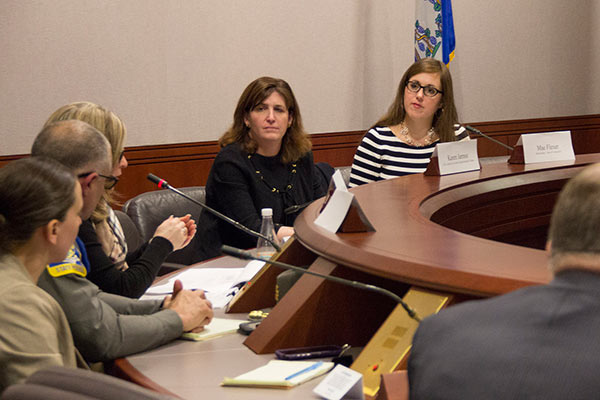Sen. Flexer and CT Coalition Against Domestic Violence Discuss Strategies for Combatting High ‘Dual Arrest’ Rates in State

State Senator Mae Flexer (D-Danielson) was joined today by leadership from the Connecticut Coalition Against Domestic Violence (CCADV), law enforcement and the judicial system for a roundtable discussion on Connecticut’s domestic violence dual arrest rates and possible solutions.
“For far too long, we have been living under a set of rules that hinders a domestic violence victim’s ability to seek help or get justice. No victim should have to fear or endure the shame and humiliation of being arrested simply for seeking help in a dangerous—and even deadly—situation,” said Sen. Flexer. “And while we’ve made changes to improve law enforcement’s response to these crimes, it is clear we still need to explore changes to this practice which levies an added burden onto a victim of domestic violence at a time when the stakes are already so high.”
Connecticut has a domestic violence mandatory arrest law coupled with a self-defense exception. When a “dual arrest” occurs, both parties are arrested because the responding officer found probable cause that both individuals committed a family violence offense while not finding evidence that one of the individuals was acting in self-defense. In 2015, there were 17,634 domestic violence arrests in Connecticut, of which approximately 14 percent were dual arrests involving intimate partners—the national average for dual arrests in these relationship categories is between 2-7 percent. Those arrests generally occurred for misdemeanor offenses, such as breach of peace or disorderly conduct.
“We remain concerned about Connecticut’s significant dual arrest rate related to intimate partner violence,” said Karen Jarmoc, chief executive officer of Connecticut Coalition Against Domestic Violence. “CCADV has worked diligently since 2013 training over 1,500 police officers on dual arrest and self-defense both independently and collaboratively with our partners at CT State Police and the Police Officer Standards & Training Council (POSTC). We look forward to continue working closely with state and municipal law enforcement to provide training and other tools that assist officers in making informed decisions related to domestic violence arrests.”
Panelists discussed considerations for addressing Connecticut’s domestic violence dual arrest rate, including:
- A comprehensive examination of dual arrest data and contributing factors to ensure that the specific circumstances surrounding dual arrest in Connecticut are fully understood prior to making policy or statutory changes
- Targeted and mandatory dual arrest/self-defense training for all officers, both state and municipal, responsible for providing training on Connecticut’s family violence laws through both recruit and in-service training
- Statutory changes, including consideration of a Primary Aggressor law which typically directs law enforcement to consider a number of factors to properly identify the “primary aggressor” in a domestic violence incident, including prior history of domestic violence, comparative injuries suffered by each party, use of threats, etc.
- Changes to Connecticut’s Statewide Model Policy for the Police Response to Crimes of Family Violence, which is a policy overseen by the Connecticut General Assembly that provides uniformity for the statewide application of Connecticut family violence laws
Share this page:
